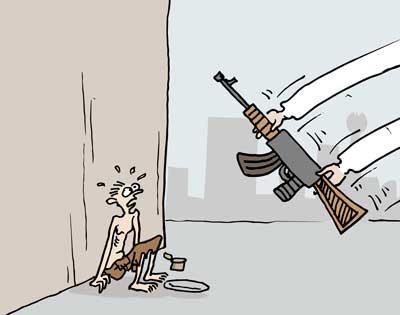Reply To:
Name - Reply Comment
Public Security Minister (Rtd) Rear Admiral Sarath Weerasekara has said he would table a proposal in Parliament to make way for military training to citizens above 18 years of age. He said the proposal aims at creating a disciplined and law-abiding nation and added that other countries that employed similar strategies have reaped benefits from such programmes.
“There is no need to fear military training. It is through military training that a person will be able to stand strong, build personality and leadership skills. Military training will ensure we have law-abiding, disciplined and responsible citizens,” the minister said.

This is not the first time that such a proposal was put forward. Former National Security Minister Lalith Athulathmudali introduced this idea in 1985 resulting in the promulgation of the Mobilization and Supplementary Forces Act of 1985. However, when it became law it did not provide for mandatory recruitment, rather created forces supplementary to the three armed forces. The Bill was presented in view of the need to transform the armed forces from largely a ceremonial role to a fully-fledged military to face the separatist threat.
In fact, mandatory military training was mooted by the Janatha Vimukthi Peramuna (JVP) in its 1977 Policy Declaration, in the wake of its leaders being released from prisons where they had been incarcerated for their role in the 1971 insurrection. The JVP said a government headed by it would provide military training for all youth, female and male, for two years after they complete their secondary education.
The Mobilization and Supplementary Forces Act was never implemented fully by any government for the past 35 years. Even when the armed forces badly felt the need for more personnel at the height of the war against the LTTE, some of its provisions such as providing military training to students were not implemented apparently because of the convolutions in implementing them in a society that had been highly divided on ethnic and political lines.
The minister has not explained whether the training he intends to impart should include weapons training which must be looked into more closely neither did he say whether the training entails mandatory military service as well. However, some 25 out of about 200 countries worldwide have laws to provide compulsory military training including the handling of weapons. In fact it is not merely military training, but a mandatory military service as it is called, for a specific period.
In most countries only men are mandated to serve in the army, navy or air force as required by the law. Very few countries such as China, Israel and North Korea conscript both men and women under the compulsory military service law. The legendary American boxer Mohamed Ali (Cassius Clay) faced five years in prison and was stripped of his boxing titles in 1967, after was found guilty of refusing to be drafted and sent to the Vietnam War. However, in the aftermath of the Vietnam War, the US accepted the fact that the retention of conscription would be impracticable.
Laws of mandatory military service in many countries also have provisions for exemptions. In Iran certain family conditions such as a person being the only son or breadwinner of the family are eligible for exemption while Israeli Arabs are not drafted, but could volunteer in that country. Jewish Females, who choose to declare they are unable to serve on religious grounds, are also exempted in Israel.
The purpose of this proposal, the minister said was to inculcate discipline among youth. No doubt, it is extremely important. Yet, without an associated scheme for purifying the highly degenerated political culture which governs all spheres of life in the country and makes a huge impact on the economic life of the people, it is doubtful if the objectives will ever be materialized.
The implementation of such a proposal in Sri Lanka will also be tricky and dangerous given the existing separatist ideology in one part of the country with the possibility of the ideology which was the driving force that impelled those who planned and executed the Easter Sunday terror attacks. In a country where the government and the majority community object to devolving police powers to provincial councils, especially to the Northern and Eastern PCs, the proposal to impart military training to youth countrywide seems inconsistent. However, despite the intention being good, this is a delicate issue which has to be handled carefully, as it might create unnecessary problems for the government, the armed forces and the country at large.